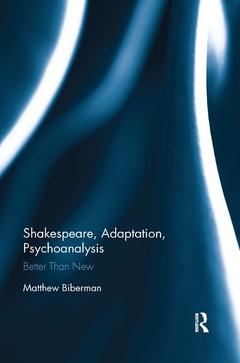Shakespeare, Adaptation, Psychoanalysis Better than New
Auteur : Biberman Matthew

CONTENTS
Note on Sources
List of Illustrations
Acknowledgements
Introduction: Beyond Bad Style, or the Curious Case of Adaptation
Chapter One: On Primary Adaptation: The Case of Nahum Tate’s "King Lear"
Chapter Two: Instances of Secondary Adaptation: Otway, Davenant and the Birth of the Cross-Over Episode
Chapter Three: Synchronous Adaptation: Hamlet, Macbeth, and the Double Falsehood
Chapter Four: Love and Adaptation: Antony and Cleopatra, Dryden’s All for Love, and Coriolanus
Chapter Five: Comedy, Tragedy, and Adaptation: The Tempest, The Enchanted Island, and Hamlet
Conclusion: Bad Style II, or Notes toward a Theory of Adaptation
Bibliography
Index
Date de parution : 12-2019
15.2x22.9 cm
Date de parution : 01-2017
15.2x22.9 cm
Thème de Shakespeare, Adaptation, Psychoanalysis :
Mots-clés :
Enchanted Island; Young Man; Tate’s Lear; Richard III; Tate’s Adaptation; Davenant Adaptation; Violate; Double Falsehood; DVD Special Edition; Gloucester; Mystic Writing Pad; Estimative Faculty; Tate’s Revision; Wax Slab; Tate’s King Lear; Mystic Pad; Folio Text; Fth Act; Swan Drawing; Ill Fate; Synchronic Adaptation; Literary Adaptation; Edward III; Tripartite Mind; Eternal Recurrence



